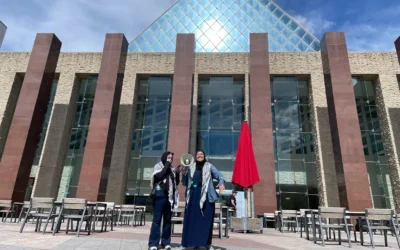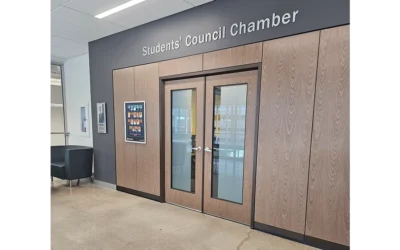If you attend a post-secondary institution in Canada, odds are you’re a member of a students’ association or its equivalent. Students’ associations are organizations that operate within a university (but separate from its administration) and lobby the university and external policy-makers on behalf of students.
First and foremost, the responsibility of a students’ association is to address the needs of the students it represents. This means reaching out to groups who are just as numerous and varied as the students these associations represent.
Building lasting relationships with students becomes crucial, and something that helps students’ associations with this process is remaining non-partisan.
“It’s important to foster relationships with all sides because you never know who’s taking power or where their direction, priorities, or policies might land,” Danika McConnell said. “It’s integral for the success and the well-being of an organization that represents so many [people] to remain non-partisan.”
McConnell is the president of the Students’ Association of MacEwan University (SAMU) and previously served as the organization’s vice president external.
“If you were to focus in one area, it really can cause the unfortunate opportunity for ties to break,” she said, adding that non-partisanship is critical to the longevity of the relationship between student organizations and the groups they work with.
McConnell said the damage done by having students’ associations adopt partisan labels far outweighs any benefits it might reap. Look across the country at McGill University’s students’ association and you’ll find a clear example of why this is the case.
Harms & benefits
On Feb. 27, McGill Daily reported the motion passed by the General Assembly of the Students’ Society of McGill University (SSMU) in support of the Boycott, Divestment and Sanctions (BDS) movement failed to pass the online ratification process, where it was voted down by the student body.
According to their website, the BDS movement is a non-violent effort to pressure Israel to meet three demands concerning the rights of Arab-Palestinians, the end to Israel’s takeover of what is considered to be Palestinian land, and the resettlement of displaced Palestinians.
As the name suggests, BDS would apply this pressure through boycotts, divestments and sanctions. Supporting the BDS movement would mean adopting its goals and alienation of Israel, which would then make its supporters partisan members of a political movement.
With 2,819 votes cast against and 2,119 votes cast in favour of the motion in SSMU’s ratification attempt, the vote proved to be a divisive one, and this is not the only instance where the Israel/Palestine issue has caused such reaction.
Divisive issue
Jean-Christophe Boucher, an assistant professor of political science at MacEwan University, explained that the polarizing nature of this vote reflects the attitudes held by the general public where this topic is concerned.
“It speaks to a lot of different issues,” he said, adding the issues are morally charged. “In this case, it’s really an ugly argument between two cases that are both right and wrong at the same time.”
Boucher said that the conflict between the two groups is not a clear-cut one, either, making the act of choosing sides a difficult and uneasy process.
In a statement released online, McGill University’s Principal and Vice-Chancellor, Suzanne Fortier, made clear that the motion was vehemently opposed by the university administration. She cites concerns about its impacts on academic freedom — the motion called for the university to cut ties with Israeli universities.
“The BDS movement, which among other things, calls for universities to cut ties with Israeli universities, flies in the face of the tolerance and respect we cherish as values fundamental to a university,” Fortier said in the release.
Unconstitutional
Additionally, according to the Montreal Gazette, a judicial committee of McGill’s students’ association ruled SSMU’s support of the BDS movement as unconstitutional in accordance with SSMU’s constitution.
The committee found that motions adopted by SSMU which supported cutting ties with any specific nation and campaigning against that nation were discriminatory. The findings noted that SSMU’s ability to equally represent all students would be hindered if the organization became involved in partisan movements.
It is unclear why the issue of whether the motion complied with SSMU’s constitution was not addressed before the motion was put through the ratification process; SSMU representatives did not respond to repeated requests for comment on the matter.
As seen with the case of SSMU, having students’ associations dabble in partisan politics can result in lasting and very damaging backlash. McConnell said this only highlights the need for students’ associations to remain non-partisan.
“From the student organization perspective, we will talk to any political stroke there is to get the student issue out there,” McConnell said. “Student issues are non-partisan issues, they don’t take alignment.”




0 Comments